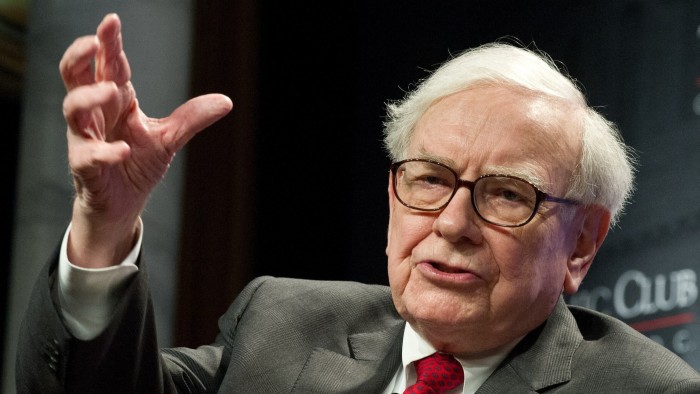Unlock the Editor’s Digest for free
Roula Khalaf, Editor of the FT, selects her favourite stories in this weekly newsletter.
American chief executives are queueing up to praise Warren Buffett, as he prepares to step down as chief of Berkshire Hathaway. Well they might. What corporate chieftain wouldn’t admire a peer who created a return more than 140 times that of the S&P 500 over 60 years?
Buffett has made many people rich and delivered useful lessons on value investing. But his career at Berkshire Hathaway comes with other oddities, including long tenure and outsized influence. The risk is that would-be corporate autocrats confuse cause with effect.
First, there’s the question of staying power. Buffett’s 55 years as chief executive of what was once a struggling textile company make him the longest-serving chief in the S&P 500. Shareholders might like to see him stay longer; Berkshire Hathaway shares fell about 5 per cent on Monday as news of Buffett’s departure sank in.
For most bosses, though, there is such a thing as too long. One study suggested that after 14 years, a chief’s contribution to a company’s value starts to decline. The corporate trend is towards serving for less time: the average tenure of an S&P 500 leader has fallen from 11 years to eight since 2021, according to headhunter Spencer Stuart. In other words, Buffett is a happy outlier.
There’s also the problematic matter of the Oracle of Omaha’s super-voting stock. He holds 30 per cent of the company’s votes with 14 per cent of the shares. Dual classes of shares were less common in the last century, but now feature in more than 20 per cent of US initial public offerings, according to Florida-based professor Jay Ritter. In tech, they’re twice as common.
Berkshire Hathaway’s simple two-track share structure looks positively rustic compared with some more recent adoptees. At data consultancy Palantir, founders hold a third class of shares that carry almost 50 per cent of the vote regardless of how much stock they own. Faraday Future Intelligent Electric, a US-listed Chinese electric vehicle company, has shares whose votes multiply if its market capitalisation hits a certain level.
As it happens, Buffett’s dual-class shares are more egalitarian than they seem. Berkshire Hathaway’s lesser-voting stock is, at least, also lower priced. It was only introduced in 1996 as a way of giving retail stock-buyers a more affordable way in. And Buffett has agreed that if he ever controlled more than 49.9 per cent of the company, he would vote shares above that level proportionately with other investors.
What’s more, the Nebraska-based tycoon has decreed that after his death, his stake will be gradually converted to lesser-voting paper and sold down. It remains to be seen whether that will inspire entrenched founders such as Meta Platforms’ Mark Zuckerberg, who are generally free to pass their clout on to future generations, whether other shareholders like it or not.
After decades of outsized shareholder returns, Buffett’s position in financial history is assured. Emulators will no doubt use his success to argue that great leaders justify special treatment. The real moral is that bosses like Berkshire Hathaway’s are one in a million.
